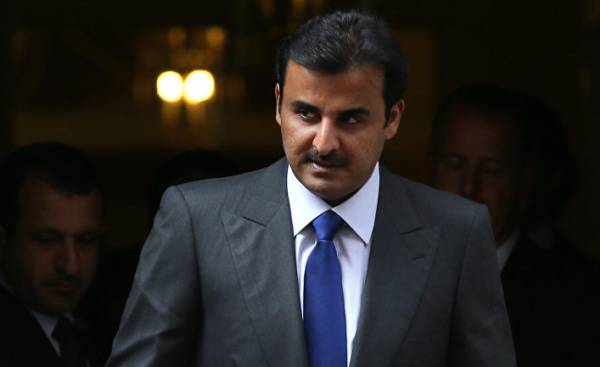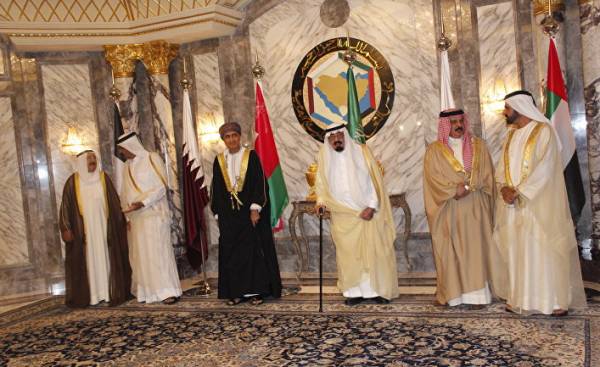
Even if the whole of Yemen will be destroyed, and with it Syria, Iraq and other Arab and Muslim countries with presidential or parliamentary systems, this does not mean that in response to the Persian Gulf States will have to confine the provision of food aid to these countries. The fact is that regardless of Iran’s quest to maintain good relations, the revolution headed by Imam Khomeini in 1978, was directed against the dictatorship of the Shah. As a result of popular demand, the Shah was overthrown and the country was declared a democracy. As a result, the new authorities characteristic hostility to the former allies of the Shah — the Persian Gulf, in which power is inherited.
Currently, one of the crown of thrones the Arabian States is experiencing a crisis. All efforts were made to prevent the collapse of the throne, any attempt of a coup, as happened with the former Emir of Qatar Khalifa bin Hamad al Thani, who was deposed by his son Hamad bin Khalifa in 1995. Then the rest of the Arabian monarchy hastened immediately to arrange the transfer of power to the new head of state, because the most important thing in this case — to save the throne, no matter who in the end will get it. The coup happened while Sheikh Khalifa was on vacation in Switzerland. He later spoke on the radio addressing the cooperation Council for the Arab States of the Gulf (GCC): “This is my son, Hamad, and I ask my brothers the kings and emirs to acknowledge his power and to cooperate with him.” However, something happened, what happened, and the Arabian monarchy acknowledged the results of the coup in Qatar, because such was the will of the ruling dynasty in the country. The deposed Sheikh Khalifa bin Hamad al-Thani remained abroad, but soon after he began to overcome age and sickness, he was allowed to return home, what happened in 2004. Since then, he was under house arrest, and only in 2016 it was moved to a hospital in Geneva, where he was treated until his death in the same year.
© RIA Novosti, Vladimir Rodionov | go to fotobanka Hamad bin Khalifa al-Thani and Vladimir Putin
In 2013, Qatar had been a “soft” coup, Sheikh Hamad abdicated in favor of his son, crown Prince Tamim, from his second wife Mozah bint Nasser al-must be put an end originating from a reputable Qatari family. The coup was evidence of the scale of the constant disagreements among members of the ruling family and other influential families of the country. According to the founder of the Qatari intelligence Department major General Mahmoud Mansour, living abroad three days ago he had received information from Qatar, according to which the leading families of the country chose four candidates for the replacement of the Emir Tamim bin Hamad as the head of state, while only one is from the dynasty of al-Thani. As noted by Mahmoud Mansour, head of these families signed an agreement, under which they will refuse to support the policy of the Amir’s sponsorship of terrorism, interference in the internal Affairs of some Arab States, and sedition and unrest in these countries, which led to the isolation of Qatar.
The greatest concern in this regard is the fact that most of the proposed candidates, do not belong to the dynasty of al-Thani. With the blessing of the United States, the Arab States broke off diplomatic relations with Qatar in order to punish the Emir Tamim bin Hamad in support of the “Muslim Brothers” against the Wahhabi Saudi Arabia. However, U.S. policy is limited to verbal attacks, which aim to strengthen the position of Saudi Arabia in the region in exchange for half a trillion dollars allocated Trump. So, two days ago, Washington sent to Doha two warships of the Navy to participate in joint military exercises in Qatar. In addition, the parties signed an agreement for the sale to Qatar of American fighters F-15 cost about twenty-one billion dollars.
If Saudi Arabia seeks to overthrow the Emir Tamim, it will not have to rely on his half-brother Abdullah bin Hamad, as the latter is hostile to the Kingdom. Saudi Arabia wants to support another half-brother of the Emir, who is opposed to his policies. As a mediator in this case is Kuwait, which operates with the consent of the leading Qatari families. The fact that only one of the four chosen candidates belongs to the dynasty of al-Thani, talks about serious changes within the ruling family and the loss of its power. This fact allows powerful families in Saudi Arabia, Kuwait, UAE and Bahrain to occupy the thrones in these countries in the future by the overthrow of the ruling dynasties such as the al Saud, Al Sabah, al Khalifa, al Nahayan. The same thing can happen even within individual Emirates: Dubai, Sharjah, Ajman, RAS al Khaimah, Fujairah and Umm al Quwain.
Since we are in UAE, you inform the ruling family about the current threat to the thrones of the Arabian monarchies and the necessity of refusal from the establishment of any form of democratic regime.
25 may 1981 in Abu Dhabi announced the establishment of the GCC, which includes the UAE, Saudi Arabia, Kuwait, Bahrain, Qatar and Oman. At the end of the meeting of their heads of state President Sheikh Zayed Ben Sultan al Nahyan as the head of the host country asked the question: “we Know that Yemen and Djibouti are seeking to join the GCC, what do you think about this?” Sheikh Zayed said the following: “Our brothers in Yemen and Djibouti will have to wait some time, until, step by step, evolving a new structure”. In fact, the queries of Yemen and Djibouti rejected over and over again for several years, and the reason was that form of government in these States is a presidential democratic Republic. This is contrary to the interests of the member States of the organization, which traditionally ruled the family. Since that time, the question of the accession of Yemen did not rise until, while former President Abd Rabbo Mansour Hadi fled from the country taking refuge in Saudi Arabia. Then the question again became the subject of discussion, because Saudi Arabia decided that now Yemen is under its control. However, the accession of Yemen to the GCC had to be removed from the agenda in connection with a heavy defeat to Saudi Arabia and its allies in the conflict with Yemen.
 © RIA Novosti, Rafael Dominowski the GCC in Riyadh
© RIA Novosti, Rafael Dominowski the GCC in Riyadh
Probably the biggest fears of the ruling families was caused by the fact that on 7 February 2013 at a meeting of representatives of member countries of the GCC in Dubai, it was announced that the organization welcomes the request of Jordan to join the Council. In addition, the parties invited Morocco to join the organization. However, it was announced the beginning of negotiations with the two countries regarding the conditions and procedures necessary for the entry. All this has caused a lot of questions about the reasons that prompted the GCC to take a decision on the accession of Jordan and Morocco. According to the leaders of the Council, this step was taken in order to maintain political stability in these monarchies amid the wave of Arab revolutions that spread from one country to another, and especially, on the background of the events in Bahrain. These disturbances threaten the regimes in the countries of the Persian Gulf. As a result, what is today Kuwait, is an attempt to protect the throne in Qatar. If Sheikh Tamim bin Hamad will be overthrown, then this could be the beginning of great change for Qatar, which will certainly dampen the hostility of Saudi Arabia, because sooner or later event in Doha will hit the interests of all Arabian States. Maybe it will happen soon.







